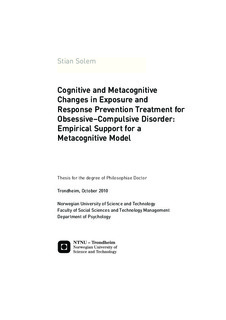| dc.contributor.author | Solem, Stian | nb_NO |
| dc.date.accessioned | 2014-12-19T14:41:27Z | |
| dc.date.available | 2014-12-19T14:41:27Z | |
| dc.date.created | 2010-10-27 | nb_NO |
| dc.date.issued | 2010 | nb_NO |
| dc.identifier | 359256 | nb_NO |
| dc.identifier.isbn | 978-82-471-2301-0 (printed ver.) | nb_NO |
| dc.identifier.isbn | 978-82-471-2302-7 (electronic ver.) | nb_NO |
| dc.identifier.uri | http://hdl.handle.net/11250/270418 | |
| dc.description.abstract | Exposure and response prevention (ERP) treatment for obsessive-compulsive disorder (OCD) has repeatedly been demonstrated as an efficient treatment for OCD and can be learned relatively easy by inexperienced student therapists (paper I). ERP was developed based on behavioral principles and the mechanisms of change have been suggested to involve reciprocal inhibition, counter-conditioning, habituation, extinction, or informal network-based emotional processing. More recent theories suggest cognitive and metacognitive beliefs as essential in the maintenance of OCD and that improvement following treatment could be mediated by changes in these beliefs. In paper II the validity of cognitive models of OCD and the metacognitive model of OCD was empirically tested. Support for the role of thought fusion beliefs, beliefs about rituals, and stop signals as predictors of obsessive-compulsive symptoms was documented. These metacognitive variables predicted more variance in obsessive compulsive symptoms than ordinary cognitions. Paper III documented further support for the metacognitive model by demonstrating empirically that change in metacognitions was a better predictor of treatment outcome than cognitive constructs such as perfectionism/certainty and responsibility/harm. The results suggested that modification of metacognitions could mediate reductions in symptoms when delivering ERP for OCD. However, the metacognitive model needs further investigation with more rigorous studies and analyses. Moreover, although the thesis suggests that changes in metacognition may be essential in ERP treatment of OCD it did not evaluate metacognitive therapy. In addition, the relationship between change in metacognition and change in specific obsessive-compulsive symptoms was not specified. This can now be tested using the Norwegian adaptation of the Obsessive Compulsive Inventory-Revised which seems to posses adequate psychometric properties allowing for dimensional assessment of obsessive-compulsive subtypes (Paper IV). | nb_NO |
| dc.language | eng | nb_NO |
| dc.publisher | Norges teknisk-naturvitenskapelige universitet | nb_NO |
| dc.relation.ispartofseries | Doktoravhandlinger ved NTNU, 1503-8181; 2010:165 | nb_NO |
| dc.relation.haspart | Solem, Stian; Hansen, Bjarne; Vogel, Patrick A.; Kennair, Leif Edward Ottesen. The efficacy of teaching psychology students exposure and response prevention for obsessive-compulsive disorder. Scandinavian Journal of Psychology. (ISSN 0036-5564). 50(3): 245-250, 2009. <a href='http://dx.doi.org/10.1111/j.1467-9450.2008.00703.x'>10.1111/j.1467-9450.2008.00703.x</a>. | nb_NO |
| dc.relation.haspart | Solem, Stian; Myers, Samuel G.; Fisher, Peter L.; Vogel, Patrick A.; Wells, Adrian. An empirical test of the metacognitive model of obsessive-compulsive symptoms. Journal of Anxiety Disorders. (ISSN 0887-6185). 24(1): 79-86, 2010. <a href='http://dx.doi.org/10.1016/j.janxdis.2009.08.009'>10.1016/j.janxdis.2009.08.009</a>. | nb_NO |
| dc.relation.haspart | Solem, Stian; Haland, Ashild Tellefsen; Vogel, Patrick A.; Hansen, Bjarne; Wells, Adrian. Change in metacognitions predicts outcome in obsessive-compulsive disorder patients undergoing treatment with exposure and response prevention. Behaviour Research and Therapy. (ISSN 0005-7967). 47(4): 301-307, 2009. <a href='http://dx.doi.org/10.1016/j.brat.2009.01.003'>10.1016/j.brat.2009.01.003</a>. | nb_NO |
| dc.relation.haspart | Solem, S; Hjemdal, O.; Vogel, P. A.; Stiles, T. C. Norwegian version ofthe Obsessive-Compulsive Inventory-Revised: Psychometric properties. Journal of Psychology. (ISSN 0022-3980), 2010. <a href='http://dx.doi.org/10.1111/j.1467-9450.2009.00798.x'>10.1111/j.1467-9450.2009.00798.x</a>. | nb_NO |
| dc.title | Cognitive and Metacognitive Changes in Exposure and Response Prevention Treatment for Obsessive –Compulsive Disorder:Empirical Support for a Metacognitive Model | nb_NO |
| dc.type | Doctoral thesis | nb_NO |
| dc.contributor.department | Norges teknisk-naturvitenskapelige universitet, Fakultet for samfunnsvitenskap og teknologiledelse, Psykologisk institutt | nb_NO |
| dc.description.degree | PhD i psykologi | nb_NO |
| dc.description.degree | PhD in Psychology | en_GB |

